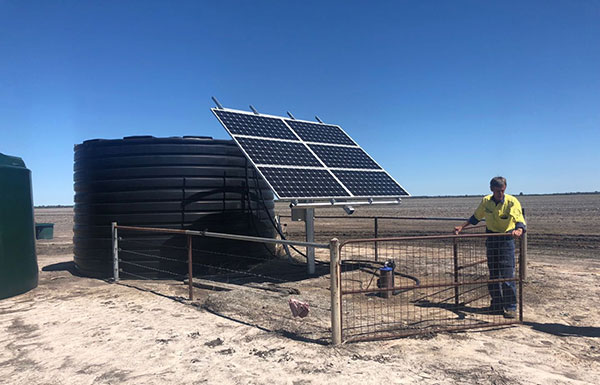In today's world, as the global energy crisis and environmental issues become increasingly severe, finding sustainable and eco-friendly energy solutions has become a common challenge for all of humanity. Solar water pumps (photovoltaic water pumps), as a green energy technology that integrates economic viability, reliability, and environmental benefits, are gradually showing their unique appeal and wide application prospects across various fields. This article will delve into the components, working principles, advantages, and applications of solar water pumps in agriculture, environmental management, and residential life from a professional perspective.
Components and Working Principles of Solar Water Pumps
A solar water pump system mainly consists of three core parts: the photovoltaic water pump inverter, the water pump, and the solar panels. The solar panels capture solar radiation and convert it into direct current (DC) electricity; the photovoltaic water pump inverter plays the role of converting this DC power into alternating current (AC) or specific frequency DC power required by the water pump; and the water pump utilizes this electricity to drive water from the source to the target location. The entire system achieves direct conversion from solar energy to water power, operating independently of external power grids, thereby achieving true "self-sufficiency."

Significant Advantages of Solar Water Pumps
- Eco-friendly and Energy-efficient: Solar energy, as a clean energy source, is inexhaustible and generates no harmful emissions during use, fully aligning with modern concepts of low-carbon, energy-saving, and environmental protection.
- Economical and Efficient: Although the initial investment in a solar water pump system is relatively high, its long-term operational costs are extremely low, with virtually no fuel or electricity expenses, significantly reducing the total cost of ownership. Furthermore, as solar technology continues to advance and costs continue to decline, its economic viability will further improve.
- Autonomous Operation: The system is highly automated and intelligent, capable of adjusting its working status according to changes in solar radiation intensity, automatically starting at sunrise and shutting down at sunset, with no need for manual supervision, greatly reducing maintenance costs.
- Strong Adaptability: The solar water pump system is not limited by geographic location or grid coverage, making it especially suitable for remote areas, islands, and mountainous regions where electricity supply is challenging, providing reliable water supply assurance for residents and agricultural production.
Applications of Solar Water Pumps in Agriculture
- Cash Crops and Farmland Irrigation
In arid and semi-arid regions, water scarcity is a key factor limiting agricultural development. Solar water pump systems, with their low energy consumption and eco-friendly characteristics, have been widely adopted in these areas. Through precision irrigation technology, they not only enhance water resource utilization efficiency but also promote crop growth and yield, bringing significant economic benefits to farmers.
- Mountain Restoration and Vegetation Recovery
Mountain restoration and vegetation recovery are crucial measures for improving the ecological environment and preventing soil erosion. Solar water pump systems, combined with water-saving irrigation techniques like drip and sprinkler irrigation, provide a stable water source for vegetation on barren mountains. This approach not only reduces restoration costs but also accelerates vegetation recovery, effectively curbing soil erosion and desertification trends.
Applications of Solar Water Pumps in Ecological Environment Management
- Soil Erosion Protection
In areas severely affected by soil erosion, solar water pump systems can draw water from rivers and lakes to irrigate vegetation on riverbanks and hillsides. This method not only replenishes soil moisture but also promotes vegetation growth and soil stabilization, effectively reducing the occurrence of soil erosion.
- Desertification Control
Solar water pump systems play a vital role in desertification control as well. They are widely used in afforestation, land reclamation, and sand control projects, providing essential water support for vegetation. Through scientifically managed irrigation, these projects not only improve the local ecological environment but also promote the sustainable development of the ecological economy.
Applications of Solar Water Pumps in Residential Life
In remote areas or regions with unstable power supply, residents often face significant challenges in accessing water for daily use. Solar water pump systems, with their autonomous operation and independence from the power grid, offer a safe and reliable water supply solution for these communities. Whether for household daily water needs or livestock watering, the system effectively meets the demand. Additionally, the application of solar water pump systems contributes to the improvement of local sanitation conditions and the overall quality of life for residents.

In conclusion, as a green, environmentally friendly, and economical water supply solution, solar water pumps demonstrate enormous potential and broad development prospects in agriculture, ecological environment management, and residential life. With continuous technological advancements and declining costs, Inverter.com believes that solar water pump systems will be more widely promoted and applied in the future, contributing more significantly to sustainable human development.
